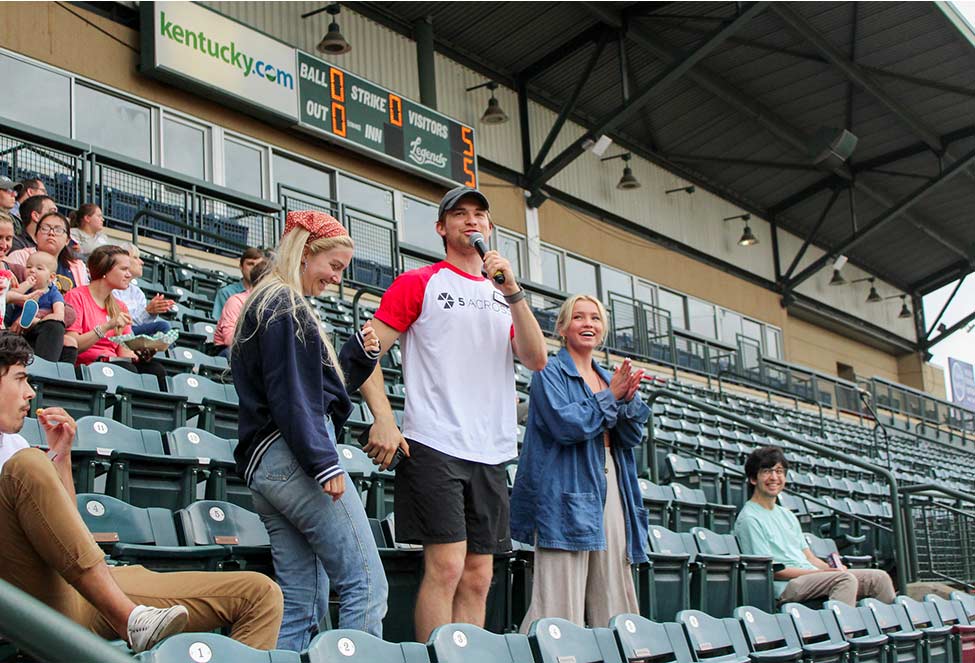LEGO Professor gives insight on the “building blocks” of success
What does the humble flatworm, the International Space Station, a $44 Billion company and a young man from Bardstown have in common? A story about innovation and value development.
Doing research on the International Space Station (ISS) is ambitious. Orbiting at 17,500 mph 240 miles overhead, the U.S. National Laboratory on the ISS is open to the public, and increasingly attractive to researchers. The life sciences work done to date, for example, has demonstrated that cells metastasize and genes express themselves differently when scientists can control for gravity.
Thanks to an agreement with NASA, Space Tango, through the non-profit enterprise, Kentucky Space, enjoys ready access and egress from the space station. Space Tango is capitalizing on that access to build hardware that experimenters may use to do rapid, iterative work in zero gravity – and do it for a reasonable price. Therapies for disease on Earth may one day emerge from a brand new field dubbed “exomedicine.”
If that wasn’t challenging enough, moving those experiments from researchers to launch facilities and back again is almost as problematic. Bardstown native Twyman Clements, the young CEO of Space Tango and a mechanical engineering graduate of the University of Kentucky, wanted to add value to that process. Pitching a brand new business to overnight services whose names you would undoubtedly recognize, Space Tango inked an agreement last spring with a $44 Billion company, FedEx. The global logistics giant is now growing a brand new and previously unheard of line of business moving space assets terrestrially thanks to Space Tango. As a matter of fact, as of this writing the FedEx Space Desk is transporting flatworms that the private space taxi, SpaceX, has just returned from orbit.
With that in mind, let the Kentucky Innovation Network introduce you to Dr. Carlos Cordon, who is a LEGO Professor of Supply Chain Management at the Swiss school, IMD, a world leader in business education. Dr. Cordon teaches executives and performs research on new business developments, consulting with multinational corporations on strategy and value chain development.
In the brief interview below, Dr. Cordon answers questions about his interest in the company.
—
1) What is the purpose of the study?
The purpose of the study is to help executives to understand how to develop new business, the concept of partnering between companies, the new developments of big data (3d printing, etc) and to use the concepts of business modeling to structure new ventures.
2) Why did you choose Space Tango?
Space Tango is an amazing development of a young startup playing in areas where it was previously thought that only big companies with a lot of money could play. It shows how new entrepreneurial companies could partner with big companies like Fedex and develop new business using the concept of the existing ecosystem (NASA, ISS, etc.) to thrive and succeed.
3) What can large companies learn from startups? What barriers are there to learning those lessons?
Large companies are very risk averse and only develop new business once many experienced executives give their approval. Startups are not about why an idea can’t be implemented but about how to successfully execute a new idea. As one executive of a leading global company explained: “we keep discussing about a promising idea until it becomes a bad idea.” The barriers to learning those lessons is that large companies are very risk averse and their executives feel that they put their career at risk if they commit to an unproven idea. The irony is that large companies can afford those risks, they have a size enough to better manage them.
4) How should entrepreneurs think about risk and uncertainty? Are there strategies for coping with uncertainty?
I believe that entrepreneurs tend to be good about risk because typically they have a passion about their business and, therefore, have an understanding about a business risk. They tend to be over optimistic (if they weren’t they will not start almost any business), so they must surround themselves with people who would bring them “back to earth.” With respect to uncertainty, the most successful strategy has been agility and flexibility. While in theory there are many others that should work, the evidence tends to suggest that agile companies are better at dealing with uncertainty.
—
Fast, iterative, scientifically-valid research in zero gravity aboard the ISS? Check. Standardized, coordinated movement of those research projects by logistics leaders here on Earth? Check. A vertical supply chain that aims high, that may in fact revolutionize how research is done in space? Check.
So what does a worm, the international space station, a $44 Billion company and a young man from Bardstown have in common? Kentucky.




